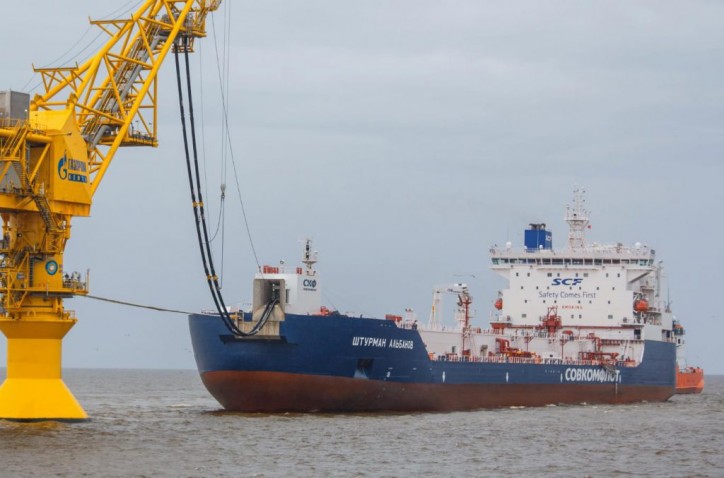Shturman Albanov, Sovcomflot’s unique Arctic shuttle tanker, was the first to receive a Polar Ship Certificate. This Certificate confirms the vessel's compliance with the requirements of the Polar Code, to take effect on January 1, 2017, and was issued by the Russian Maritime Register of Shipping (RS) on December 22, 2016.
Shturman Albanov is the lead ship in a series of Arctic shuttle tankers ordered by Sovcomflot Group under a long-term contract with Gazprom Neft. They are designed to carry crude oil from the Yamal Peninsula (YNAD) to the port of Murmansk all year-round. Each tanker has deadweight of approximately 42,000 tonnes (Shturman Albanov: 41,454.5 tonnes). The Russian Maritime Register of Shipping (RS) assigned the vessels an ice class Arc7.
Shturman Albanov is registered under the Russian flag and has Saint Petersburg as her home port. Her technical characteristics are unique. The design of the new vessel takes into account the specific features of the waters in the Gulf of Ob, where some areas are relatively shallow – about 10 metres deep – and which is covered with ice from October to July. Shturman Albanov is capable of operating in the Arctic all year-round at temperatures down to –45°С. Her propulsion system consists of two Azipod thrusters with a total capacity of 22 MW, which provides a high ice-breaking capability and good manoeuvrability in sailing through ice drifts and heavy ice fields.
PAO Sovcomflot (SCF Group) is one of the world's leading shipping companies, specialising in the transportation of crude oil, petroleum products, and liquefied gas, as well as servicing offshore upstream oil and gas installations and equipment. The Group’s fleet comprises 145 vessels with a total deadweight of over 13 million tonnes. The company is registered in St. Petersburg with offices in Moscow, Novorossiysk, Murmansk, Vladivostok, Yuzhno-Sakhalinsk, London, Limassol, and Dubai.
The Group offers a wide range of vessels in the market segments most demanded by major Russian oil and gas companies. With its own technical development and unique approach to advanced technologies, Sovcomflot can meet the most demanding customer requirements, providing effective transportation for oil & gas companies.
The Polar Code (International Code for Ships Operating in Polar Waters) was developed and adopted by the International Maritime Organization (IMO). The Code was developed based on an assessment of risks specific to polar waters and is designed to ensure safe operation of ships and protection of the polar environment. From 1 January 2017, the requirements of the Code regarding maritime safety will become mandatory for new ships built on or after that date. Ships built before that date are to be brought in line with the requirements of the Code no later than the date of the first renewal or intermediate survey after 1 January 2018.
The operational environmental protection requirements include a total ban on the discharge of oil and oily waters, noxious liquid substances, operating restrictions on the discharge of sewage and garbage, etc. The Polar Code will not apply to warships and ships used for public non-commercial purposes. In the Arctic, the Code will apply to the space to the east of the Kanin Peninsular to the Bering Strait and the Bering Sea north of 60 N. As for Antarctica, the Polar Code will apply in the area south of 60 S.
Source: SCF Group


